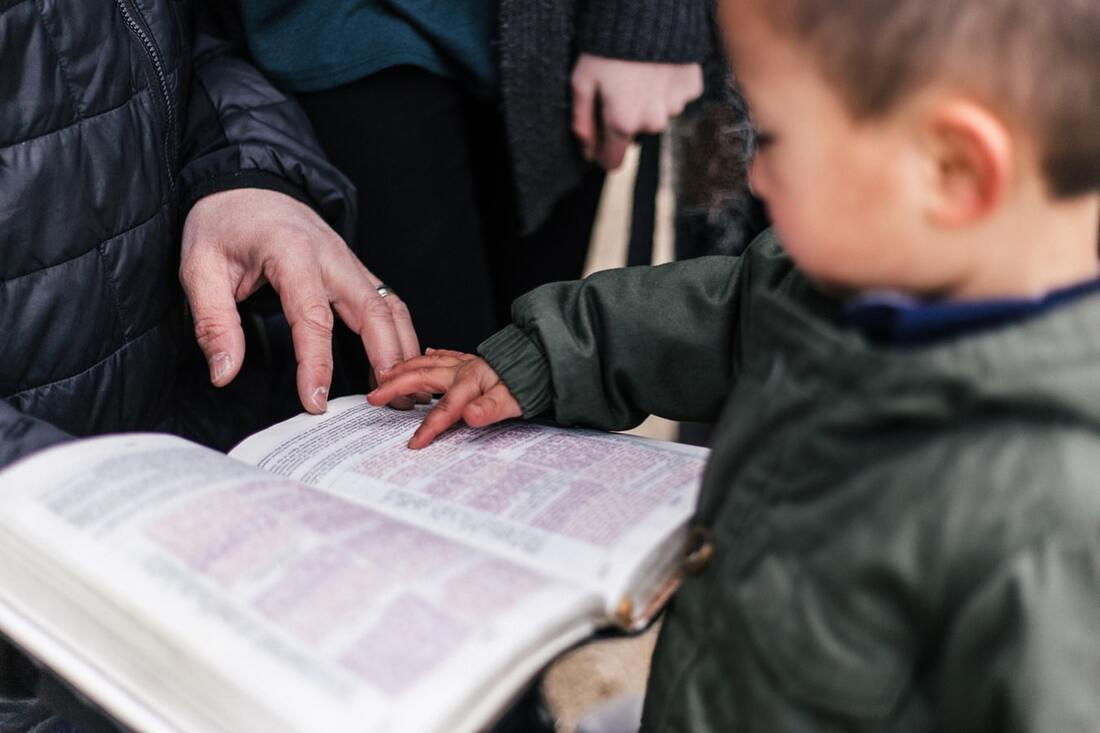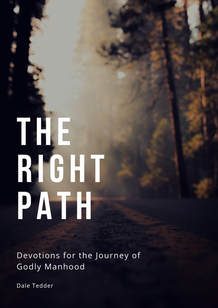|
(From the archives. I wrote this when my children were much younger, but I believe the key ideas are still helpful. I know those regular times together blessed us as a family. As my children have gotten older, our family discipling now looks a bit different, but what we did together around the table laid a solid foundation - spiritually and relationally. Perhaps later this week or next I'll do a little video on some of the resources we used that were "fan favorites" with our kids. Enjoy.)
Fear and Trembling What is family worship? What does it look like in practice? I’m often asked questions like these. Family worship is one of my favorite things to talk about, and yet, there’s a danger in writing on topics like this, or parenting, or marriage, or any other topic in the same neighborhood. The danger is that the reader may begin thinking the writer has: 1.) Figured all this stuff out and, 2.) Is executing it perfectly. In my case, both assumptions would be a mistake. I’m learning with each and every new day. But I feel I have learned enough to add some value to other parents just starting out. And so I prayerfully pass it along. Three Forms of Worship The puritans used to distinguish three forms of worship: Private, Family, and Corporate. Private worship would include your “alone time” with God – in prayer, reading his Word, reading devotional literature, singing hymns, etc. Corporate worship takes place when a local congregation gathers together (usually on the Lord’s Day or perhaps a Wednesday evening) to sing, pray, receive the sacraments, and hear God’s Word read and exposited. Family worship, as you have no doubt guessed by now, is a combination of the two, (minus the sacraments), done in the context of the family. How We Do It My family typically has family worship during our breakfast time together. It’s a process that seems to be ever-evolving, but I’ll give you a sample of what we typically do. Prayer and Scripture Usually my wife or I open in prayer, thanking God for blessing us through the night, giving us life for another day, and bringing us together to worship him. We are presently reading through the Gospel of John, so I will read about half a chapter of that. John’s chapters are pretty long, so I have been hesitant to attempt to take on a whole chapter. When we have read Paul’s epistles, a whole chapter isn’t as demanding. An accompanying reason I don’t read a whole chapter at a time is because there’s so much rich content in each chapter. Just like a sermon, each chapter needs to be broken down into smaller bite-sized portions so the family can talk in greater depth about what has just been read. After I read the text, I try to lift one or two thoughts from it and share those with the children. Or, more often than not, I’ll ask them questions to make sure they got the key points. I once heard R.C. Sproul, Jr. say he always preached sermons to his children during their family worship time and that his sermons were generally 30…(long pause for effect)…seconds. Our “sermon” is not much longer. Catechism After our Bible reading we move to a catechism. A catechism is simply a way to learn the Christian faith in a question-and-answer format. For example, the first question of our catechism asks, “What’s our primary purpose for being here?” Answer: “To glorify God and enjoy him forever.” We spend one week (in theory) on each question. There is a very brief devotional explanation of the question and answer for each day of the week. Before I ask a new catechism question, I review the last few questions, just to make sure the kids (as well as mom and dad) remember what we’ve already learned. Devotional After our catechism question, we move to a devotional that “hits the kids where they live” in a more obvious way. I qualified that statement the way I did because I believe reading Scripture and studying catechism questions are essential for discipling our children. But in our day and age, those two things are often seen as “irrelevant for life.” I think it’s all in the delivery. Finishing Up After that, depending on our time, we may sing a hymn or the Gloria Patria, recite the Apostles’ Creed and Lord’s Prayer, and lastly, pray for our day and any prayer concerns we know about. That may sound like a lot, but actually 15 minutes would be our absolute longest. And even that would have sporadic intermissions of telling my youngest son to get back in his chair or to quit stealing his sibling’s bacon. When you first begin family worship, it may feel a little mechanical and awkward. Trying new things usually feels that way. But trust me, you do get into the groove after a while. And best of all, the kids love doing it. Ours even remind us if we forget. You can’t beat that! Two Caveats First of all, you will need to figure out a pattern of family worship that fits your family. Our way isn't the "right" way. It’s our way. Besides that, it changes from time to time to fit the needs and/or demands of our family. There's an old saying that goes, “the one you use is the one that works.” That's true with family worship. Secondly, family worship isn't the only way to disciple your children. In fact, it shouldn't be. However, if you want to take the Bible’s admonition seriously to disciple your children, then I believe this is a wonderful and effective way to do it. Besides that, it's fun! And, it’s the best investment in eternity you can make. Walking Points
Grace and Truth, Dale
0 Comments
Southside family... Our need to trust God during turbulent times like these is critical. So how do we do that? In this brief video I offer some encouragement and a couple of key ideas to help us cultivate deeper trust in God during such times. PS: don’t forget to subscribe to our church YouTube channel. Also, click here to read more about trusting in the Lord. A word of encouragement for the folks at Southside United Methodist Church for this turbulent time in which we are living. Also, I'm passing along some information for how and why folks need to "get on Zoom." Southside's own Sarabeth Soule put together this very helpful video to teach our church family how to Zoom. Thanks Sarabeth!!! Introduction For a couple of months now, two of my Bible studies have been studying the Cross of Jesus. There are few topics more important than the work of Jesus on the Cross - and the love of God for us - that’s expressed so deeply on Calvary. And what I’ve discovered in my studies is that the Book of Hebrews is in a class by itself in helping us see the love God has for us, in and through the work of Jesus on the Cross. The Book of Hebrews The author of Hebrews had a very definite purpose in mind as he wrote his letter. He wanted to show the superiority of Jesus and the new covenant over the old covenant. His reason was that many of the Christian believers to whom he was writing had come out of Judaism and now were facing persecution. Some were being tempted to turn back to what they had left behind. They had found new life in Christ, but some were beginning to question whether Jesus was worth it. Maybe you’ve felt that way. Maybe you too have wondered if following Jesus is worth it. Perhaps you’ve thought that the cost of discipleship – of denying yourself, picking up your cross daily and following Jesus - is asking too much. Maybe like the Israelites who were following Moses in the wilderness, you’ve thought that the food you had as a slave back in Egypt wasn’t that bad after all. That thought has crossed my mind from time to time. But then I read in Scripture the kind of message I find in Hebrews, and I come to see yet again, God’s great love for me – and for all of us – and I’m reminded that following our Lord, whatever the hardship, is more than worth it. Our Text Here’s how our Scripture puts it. Hebrews 9:11-14 says, But when Christ came as high priest of the good things that are now already here, he went through the greater and more perfect tabernacle that is not made with human hands, that is to say, is not a part of this creation. 12 He did not enter by means of the blood of goats and calves; but he entered the Most Holy Place once for all by his own blood, thus obtaining eternal redemption. 13 The blood of goats and bulls and the ashes of a heifer sprinkled on those who are ceremonially unclean sanctify them so that they are outwardly clean. 14 How much more, then, will the blood of Christ, who through the eternal Spirit offered himself unblemished to God, cleanse our consciences from acts that lead to death, so that we may serve the living God! Lesser to Greater The folks Hebrews is addressed to needed to be encouraged. And the author does this by using what’s called, “lesser to greater” arguments. Jesus taught in the same way. In Matthew 7:9-11, Jesus taught… 9 “Which of you, if your son asks for bread, will give him a stone? 10 Or if he asks for a fish, will give him a snake? 11 If you, then, though you are evil, know how to give good gifts to your children, how much more will your Father in heaven give good gifts to those who ask him! (emphasis mine) In Matthew 12:11-12, he puts it this way… 11 He said to them, “If any of you has a sheep and it falls into a pit on the Sabbath, will you not take hold of it and lift it out? 12 How much more valuable is a person than a sheep! Therefore it is lawful to do good on the Sabbath.” (emphasis mine) The author of Hebrews uses this rhetorical device throughout his letter to show the superiority of Jesus in several ways. The High Priest First of all, we learn in our text that Jesus is our High Priest. In the Old Covenant there was a great barrier between God and his people. In the Tabernacle, and later the Temple, there was a great veil that separated God’s people from the Holy of Holies. Only the high priest could go behind the veil to bring sacrifices to God. But the death of Jesus spiritually and literally tore the veil in two, so that there was no longer anything preventing us from approaching God directly. Also, when the high priest in the Old Covenant entered the Holy of Holies to offer sacrifices to God, he had to first offer a sacrifice for his own sin. Because even though he was the high priest and a holy man, he was still a sinful man. But Jesus was greater because Jesus was without sin. Hebrews 4:15 says… For we do not have a high priest who is unable to empathize with our weaknesses, but we have one who has been tempted in every way, just as we are—yet he did not sin. The Sacrifice In the Old Covenant the high priest brought in an animal to sacrifice. In the New Covenant, the High Priest was the sacrifice. Our Lord Jesus Christ offered himself on our behalf. His life for ours. Do you remember what John the Baptist said when he saw Jesus approaching him? He declared these words in John 1:29, … “Look, the Lamb of God, who takes away the sin of the world! John understood the mission of Jesus as, “the lamb without blemish,” the Israelites were to sacrifice at the Passover, in Exodus 12. The prophecy in Isaiah 53:7 points to this. He was oppressed and afflicted, yet he did not open his mouth; he was led like a lamb to the slaughter, and as a sheep before its shearers is silent, so he did not open his mouth. (emphasis mine) He laid down his life for those he loves. His life for ours. Once For All In the Old Covenant, the sacrifice on the Day of Atonement had to be repeated annually because the blood of animals was purely symbolic. It revealed that the wages of sin is death (Romans 6:23). It taught God’s people that sin is a big deal. It separates us from a right relationship with God. It has to be atoned for. And yet, the death of animals, offered by a sinful high priest, could do no more than point to something greater, something beyond itself, something that was to come. And something greater did indeed come! God came in the Person of his Son, Jesus Christ, and he offered himself as a “once-for-all” sacrifice. That phrase, “once-for-all,” appears over and over again throughout Hebrews. It speaks of the permanence and perfection of the work of Jesus on the Cross. Therefore, there’s no need to repeat the sacrifices anymore. All that needs to be done, has now been done. Therefore, we’re called to trust in his sacrifice alone. The death of animals only provided a temporary, symbolic, and ceremonial cleansing from sin. But the author of Hebrews makes it clear that the death of Jesus cleanses us from all unrighteousness – both outward and inward. It cleans our hearts. Verse 14 says, How much more, then, will the blood of Christ, who through the eternal Spirit offered himself unblemished to God, cleanse our consciences from acts that lead to death, so that we may serve the living God! (emphasis mine) Because of what Jesus did on our behalf, we no longer need to be weighed down by the burden of our past – the guilt and shame of who we were, or what we did, before we came to know Christ. We now have a freedom that’s been won by our Lord Jesus on the Cross. The Love of God God did all of this because he loves us. The Apostle Paul emphasized this in Romans 8:9, But God demonstrates his own love for us in this: While we were still sinners, Christ died for us. (emphasis mine) And because we’re now new creatures who are free in Jesus Christ, the author of Hebrews says we can now “serve the living God.” The word, “serve,” in this verse points to the worship of God, more than anything else. Because the veil to the Holy of Holies has been torn in two, we can now approach God in worship, unhindered by the oppression, shame, and guilt of our sin. All of that has been atoned for. We’ve been washed. We’ve been redeemed. We’ve been reclaimed. His life for ours. Aslan and Edmund In the book, The Lion, The Witch and The Wardrobe, by C.S. Lewis, one of the story’s four children, Edmund, betrayed his brother and sisters by telling the evil White Witch where they’re hiding. And in the Land of Narnia, where the story takes place, the penalty for being a traitor… is death. Edmund was a young man and was understandably terrified at this prospect. And even though he betrayed his family, they forgave him and thus they begged Aslan, the great lion and King of Narnia, to intervene, to do something to get Edmund off the hook. Maybe an exception to the rule could be made this time. However, Aslan, who is the Christ figure in the story replied, the law is the law and betrayal is indeed worthy of death. The White Witch, therefore, laid claim to Edmund in order to be his judge and executioner. Yet Aslan and the White Witch met privately to discuss the matter, over a long period of time. Upon their return, Aslan declared Edmund would not be put to death, and was now free. Later, that evening, after a great celebration was over, Aslan, somber and alone, left the camp where all the Narnians were staying, and made his way to the Great Stone table, which represented a sacrificial altar. And there, the White Witch and all her wicked followers, bound Aslan, shaved his great mane, all the while mocking and beating him. And he took all of this without defending himself. Without trying to fight them off. Without trying to talk them out of it. And there on the great Stone Table, Aslan was put to death. He was killed by the witch’s blade. He died in the place of Edmund and took the punishment Edmund deserved. His life for Edmund’s. Isaiah 53:4-5 says, Surely he took up our pain and bore our suffering, yet we considered him punished by God, stricken by him, and afflicted. 5 But he was pierced for our transgressions, he was crushed for our iniquities; the punishment that brought us peace was on him, and by his wounds we are healed. (emphasis mine) His life for ours. There is no greater love than this. God has done a great work on our behalf because he loves you and me. Our response is to love him, trust him, and follow him. And when we consider all he’s done for us, how could we do otherwise? But thanks be to God that the story of our Lord Jesus, our Great High Priest and sacrifice, didn’t end at the Cross on Good Friday. Because Sunday was on the way. Walking Points
Read this post or print this PDF to look at later.
Three Anchors of Hope
There are times in our lives when our most deeply held values and beliefs are tested with fire. This is God’s refining (or pruning) process. With it comes genuine pain, heartache, and difficulty. Yet, ideally, the person who comes out the other side is closer to God and the likeness of Christ. It is during times like these we discover if we really believe what we say we believe. Over the last twenty-something years, I’ve been greatly influenced by Scripture and godly authors who have deepened my understanding and conviction regarding three great anchors of hope for tough times. I have come to a place in my life in which I embrace these key truths as the only way in which I am able to trust God, regardless of the circumstances. They are, 1. God is good and loves me very much. Because this is true, I know God has my best interest at heart. He is for me and not against me. 2. God is all-wise. Therefore, not only does God know what my best interest is, but he also knows the best way to bring my best interest about. 3. God is sovereign. God is in control of his universe. Therefore, not only does he have my best interest at heart, but he can bring it about. Trust in the Lord I believe those three affirmations with all my heart. My belief is no mere intellectual acknowledgement. These three truths are in my bloodstream. Thus, because I so deeply believe these things are true, I know I can always trust God. The God described in those three statements is the awesome God of Holy Scripture, the God and Father of our Lord, Jesus Christ. Surely that is the God King Solomon had in mind when he wrote these words, Proverbs 3:5 – Trust in the Lord with all your heart and lean not on your own understanding; Solomon goes on to say we are not to be wise in our eyes. But that’s exactly what we do when we suppose, even for a second, that we know better than God. It’s laughable to think we know what our best interest is in any situation, no matter how trivial. Among our many deficiencies, we have not been given an omniscient mind that knows all possible scenarios and outcomes of those scenarios. Such knowledge is essential in knowing how to discern what the very best plan for our life would be. It really is arrogant to lean on our own understanding. Think about the words “lean” or “depend.” They carry with them the notion of putting one’s weight on or against something that will help provide stability. Would you really prefer to put all your weight against something weak, fragile, and incapable of bracing you? Instead, wouldn’t you rather put your weight against an immovable, utterly dependable, trustworthy Rock? That’s the God of Holy Scripture. Yet, how often do we turn to our own wisdom and understanding? Enter, King Asa I had something of a roller-coaster ride of emotions when I first read about good King Asa in 2 Chronicles. Because good kings are so few and far between in the Old Testament, I celebrated his faithfulness to God. Notice what we read about him in the following verses. 2 Chronicles 14:2 – Asa did what was good and right in the eyes of the Lord his God. 2 Chronicles 14:5 – He removed the high places and incense altars in every town in Judah, and the kingdom was at peace under him. 2 Chronicles 15:1-2 – The Spirit of God came upon Azariah son of Oded. [2] He went out to meet Asa and said to him, “Listen to me, Asa and all Judah and Benjamin. The Lord is with you when you are with him. If you seek him, he will be found by you, but if you forsake him, he will forsake you. 2 Chronicles 15:8 – When Asa heard these words and the prophecy of Azariah son of Oded the prophet, he took courage. He removed the detestable idols from the whole land of Judah and Benjamin and from the towns he had captured in the hills of Ephraim. He repaired the altar of the Lord that was in front of the portico of the Lord’s temple. 2 Chronicles 15:16-17 – King Asa also deposed his grandmother Maacah from her position as queen mother, because she had made a repulsive Asherah pole. Asa cut the pole down, broke it up and burned it in the Kidron Valley. [17] Although he did not remove the high places from Israel, Asa’s heart was fully committed to the Lord all his life. But Then Verse 17b sums it up all so nicely. I couldn’t help but cheer as I read those verses, asking God to make my heart just as fully committed to him as King Asa’s. But then… If you don’t already know the story, then you experience the rug getting suddenly yanked out from underneath you. For in 2 Chronicles 16:1-6, we learn King Asa, who had placed his trust in the Lord, now put his trust in his own wisdom and ingenuity. To make matters worse, his plan seemed to work. He must have thought all was well. Yet we learn of the consequences of his plan in 2 Chronicles 16:7-9, At that time Hanani the seer came to Asa king of Judah and said to him: “Because you relied on the king of Aram and not on the Lord your God, the army of the king of Aram has escaped from your hand. [8] Were not the Cushites and Libyans a mighty army with great numbers of chariots and horsemen? Yet when you relied on the Lord, he delivered them into your hand. [9] For the eyes of the Lord range throughout the earth to strengthen those whose hearts are fully committed to him. You have done a foolish thing, and from now on you will be at war.” What Could Have Been These words of Hanani could have served as an impetus for repentance. The opportunity was there for Asa to see the foolishness of his ways and get back on track with God. He could have admitted his rebellion and returned to God. Asa would have been no different than any of us who have wandered off the right path from time to time as we sought our own way, according to our own wisdom. Our loving and merciful God is always there at the ready to offer pardon and renewal. I’m astounded at how patient God is with me in my own life. But Asa went a different way. He chose to respond in anger to the reprimand. He “shot the messenger” rather than taking heed to the message (v. 10). Thus, we read these sad words in verses 12-13, In the thirty-ninth year of his reign Asa was afflicted with a disease in his feet. Though his disease was severe, even in his illness he did not seek help from the Lord, but only from the physicians. [13] Then in the forty-first year of his reign Asa died and rested with his fathers. Sad indeed… even tragic. Finishing Well I have a great desire to run the race of faith to its completion and finish well. Don’t you? But that journey is a lifetime pursuit. We must persevere. No matter how much God has blessed us we must never presume upon his grace. We must not assume God owes us any good thing. We must beware of taking our lives into our own hands and depending on our own wisdom to see our way through, even when (especially when) things seem to be going so well. It’s during those exceedingly tough times in life you discover who or what you’ve really been placing your trust in all along. Instead, a lifetime of humility before God is called for. Hosea reminds us in 14:9, Who is wise? He will realize these things. Who is discerning? He will understand them. The ways of the Lord are right; the righteous walk in them, but the rebellious stumble in them. Zephaniah too, calls us to seek humility. Zephaniah 2:3 – Seek the Lord, all you humble of the land, you who do what he commands. Seek righteousness, seek humility; perhaps you will be sheltered on the day of the Lord’s anger. I want to finish well. Whether my last day on earth is today or 50 years from now, I want to finish well. I want to hear those words every follower of Jesus Christ desires to hear, Matthew 25:21 – “…’Well done, good and faithful servant! You have been faithful with a few things; I will put you in charge of many things. Come and share your master’s happiness!’ Therefore, between today and “that day” I must trust in the Lord with all my heart and lean not on my own understanding. In all my ways I must acknowledge him and he will make my paths straight. Walking Points · What are some obstacles in your life that make it difficult to trust God during the good times? · During the tough times? · What are some spiritual practices you can begin today to help you grow in your ability to trust God? · Set a meeting with a godly friend and share your ideas and ask for prayer. Prayer Gracious God and Father of our Lord and Savior, Jesus Christ, I praise you for your goodness, sovereignty, and wisdom. Not only do you want what is best for me, you know what is best for me, and the best way to bring it about. Moreover, because you are sovereign, you are able to bring it about. Thank you! I pray, O Lord, that you will help my children to love you more and more in knowledge and depth of insight. Help them to always know what is best and to continually grow in purity and blamelessness. May their lives ever bring you glory and praise. In Christ I pray. Amen. Character Then Influence
In his commentary on the Sermon on the Mount, John Stott reminds his readers that if Matthew 5:3-12 (the Beatitudes) is about a Christian’s character, then Matthew 5:13-16 is about a Christian’s influence in this world. I have always loved the words of Matthew 5:13-16, which describe Christian influence as salt and light. These words of Jesus point us toward the right balance of inward piety and outward action. It’s important to note Jesus doesn’t tell us to go out and be salt and light. He declares we already are salt and light. As men and women who have experienced new birth we are now new creatures in Christ whose character is increasingly reflected in the Beatitudes. To paraphrase the Apostle Peter, we are holy so we should go and be holy. We are to “go be who we already are,” Jesus and Peter teach us. Two Cautions I love this text because it strikes an important connection and balance between inward piety and outward action. The inward and private pursuit of the devotional life, of spiritual introspection and reflection is vital, but if it never moves one forward to “live” the life of Christ in the world then it can become an empty and useless form of asceticism. A person can become quickly self-absorbed in their own stuff if their piety never leaves the prayer closet or Bible study. I hasten to add that this is not the greatest threat to the church today. Would that more people spent greater time in the prayer closet and Bible study. That leads me to the other side of the coin. As important as outward action (good works) is, if godly character is not undergirding and directing it, then it can become nothing more than the cause de jour. It can morph into a judgmental and self-centered way to build yourself up. Not only that, without the knowledge of Christ and the godly character that comes from that relationship, such action can quickly lead to burnout and disillusionment because, to paraphrase Jesus in John 15, the branch was attempting to do all the work without being connected to the vine. Thus, the branch lacked sustenance, power, and direction. The Role of the Church To live as salt and light means disciples of Jesus Christ must exercise the godly influence of the Kingdom of God in the midst of the decay and darkness of the Kingdom of this world. A ministry of discipleship should include educating, equipping, and encouraging followers of Jesus Christ to take up his call to extend his Kingdom into every sphere of their lives as salt and light. Whether it’s teaching disciples how to build up their own faith and character so they can faithfully live as salt and light, or equipping and encouraging them to live out that faithfulness at home with their family and friends, at school, work, church, in their neighborhood, community, city or town, or even in the broader culture or world, a discipleship ministry should focus on both inward piety and outward action. This is how the church can faithfully minister as salt and light in today’s world. Walking Points
|
Sermons & Etc.Categories
All
Archives
March 2024
|
||||||





 RSS Feed
RSS Feed

